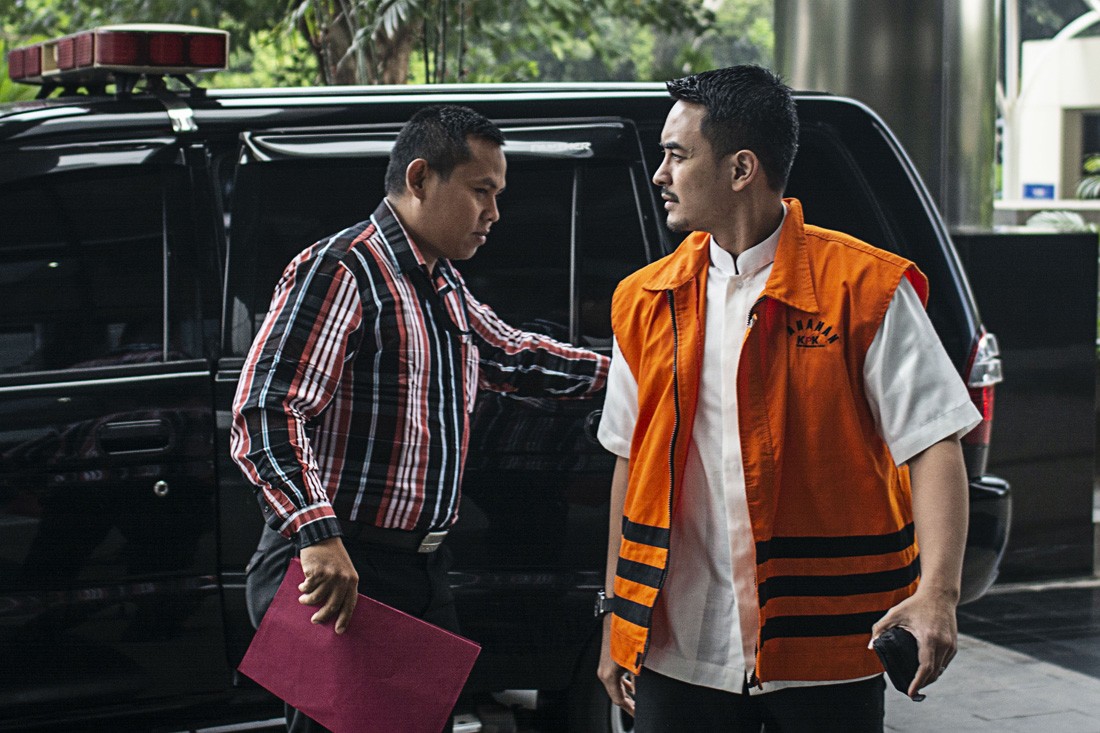Popular Reads
Top Results
Can't find what you're looking for?
View all search resultsPopular Reads
Top Results
Can't find what you're looking for?
View all search resultsRegional leaders, candidates in spotlight for corruption
Change text size
Gift Premium Articles
to Anyone
T
he year 2018 was the year when dozens of new regional leaders entered office with fanfare after being elected in the 2018 simultaneous regional elections. But, it was also the year when some others gave up the job with shame after being accused of corruption.
As of Dec. 19, the Corruption Eradication Commission (KPK) had handled dozens of graft cases implicating 30 regional leaders this year — a significant increase from 14 in 2017. Regional heads were the third-most individuals arrested by the antigraft body this year, after legislative members and businesspeople.
Despite cases found in regions far from the busy capital of Jakarta and areas considerably less familiar to the general population, some made national headlines, including those involving two governors — Zumi Zola Zulkifli of Jambi and Irwandi Yusuf of Aceh.
Some local leaders — who at that time were either seeking reelection or contesting a higher office in the regional elections in June — were also in the spotlight for corruption, for example, Marianus Sae, Ngada regent in East Nusa Tenggara (NTT) who placed his hat in the NTT gubernatorial election.
The KPK named Marianus a suspect for bribery pertaining to several construction projects across Ngada in February, just hours before the NTT election committee announced his candidacy in the gubernatorial election.
There were indications that Marianus used the illicit money to fund his campaign.
Following Marianus’ arrest, KPK chairman Agus Rahardjo warned other candidates that it might not be the last arrest as the KPK would continue its crackdown on incumbents if it found sufficient evidence of corruption.
It turned out the KPK fulfilled its promise.
The KPK weeded out nine candidates contesting elections who were suspected of graft — three of whom were gubernatorial candidates — with the latest incumbent regent of East Java’s Tulungagung, Syahri Mulyo, in June.
Syahri was named a suspect for allegedly accepting bribes paid by a businessman to secure a bid for a local procurement project only three weeks before voting day. He turned himself in to the KPK a day later.
A permissive culture has long been blamed for corruption, which was evident in Tulungagung and North Maluku where the tainted track record of candidates did not prevent voters from casting ballots for graft suspects.
From behind bars in KPK custody, Syahri garnered almost 60 percent of the vote and won the election by an almost 20 percent margin. He reportedly was the regional head with the shortest stint of three minutes before he was stripped of his position and replaced by his running mate as acting regent in September.
In North Maluku, the election results showed that a plurality of voters had cast their ballots for graft suspect Ahmad Hidayat Mus in the province’s gubernatorial race.
Ahmad, a former regent of Sula Islands in North Maluku, secured 31 percent of the vote from Wednesday’s regional election, leading a field of four candidates. North Maluku’s election result is currently being disputed at court.
Both Syahri and Ahmad are currently standing trial.
A case in Southeast Sulawesi illustrated how a political dynasty employed corrupt practices to prolong the family’s authority over the region.
It was very much a case of like father like son when Kendari Mayor Adriatma Dwi Putra was arrested by the KPK in Kendari, the capital of Southeast Sulawesi. His father, Asrun, a former Kendari mayor who had placed his bid in the Southeast Sulawesi gubernatorial race at that time, was nabbed three hours later that day, also in Kendari.
Investigators found indications that Adriatama allegedly assisted his father in a bribery case related to a road construction project in Kendari to help fund his father’s campaign.
The father and son were sentenced to jail in October and stripped of their right to run for public office for a couple of years after they have completed their sentences — just like many other convicted regional leaders, including Marianus.
But the KPK crackdown and the court revocation of political rights appears to have failed to deter fellow local leaders from accepting bribes, with the latest arrests involving the Pakpak Bharat regent in North Sumatra in November and Cianjur regent in West Java this month.
Regional Autonomy Watch’s Agung Pambudi said the country’s system had yet to support the emergence of clean figures as regional leaders.
“To be elected, candidates must either have an extraordinary track record to be acknowledged by the people, or be really corrupt to have access to unlimited resources to bribe people to vote for them,” he said.
This article was originally published in The Jakarta Post's print edition on Dec. 26, 2018, with the title "Regional leaders, candidates in spotlight for corruption".











